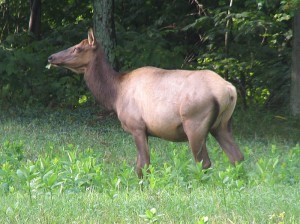
An aggressive female elk is the latest animal to be killed by Parks Canada this summer and the fifth elk to be killed in Jasper this year adding to a growing list of animals destroyed by staff in both Jasper and Banff National Parks.
On the morning of Aug. 2, Parks Canada staff responded to a report of a woman and her dog running into a female elk at the Fairmont Jasper Park Lodge.
According to Steve Young, a communications officer for Jasper National Park, the elk knocked the woman to the ground, resulting in non-life threatening injuries including some broken bones, bruises and cuts.
Young said the woman was quickly transported to hospital.
After the attack, human wildlife conflict specialists hazed the elk away from the location, ensuring that no further incidents would occur. The elk, which was known to Parks staff, was then located and euthanized.
“When wildlife becomes too comfortable around humans, they become a risk to visitors and themselves,” Young wrote in an email, adding that people should stay at least 100 metres away from elk.
In a follow up conversation he confirmed it’s the fifth elk killed in Jasper by Parks Canada this year.
Despite Parks’ best efforts, elk aren’t the only species Parks has been forced to put down this year.
Back in May, Parks was forced to kill a male black bear after an aggressive encounter with a group of people near the Valley of the Five Lakes.
This was the first time Parks has had to destroy a bear in Jasper National Park since 2014—when two bears were killed under similar circumstances.
In the neighbouring mountain town of Banff, two wolves were killed this summer.
According to the Rocky Mountain Outlook, Banff’s weekly newspaper, Parks wildlife managers killed a young female wolf, Aug. 3, after it got into food and garbage left out by campers at a Banff campground.
The wolf had been involved in multiple incidents between July 29 and Aug. 1 at Two Jack Main and Lakeside campgrounds.
Prior to killing the wolf all tent sites were removed from the campgrounds, but it did little to deter the wolf’s bold behaviour.
It’s the second Bow Valley wolf pack member put down by Parks Canada this summer after both became food-conditioned—the other wolf was a breeding female euthanized in June.
Park wardens in Banff charged 20 campsites in July for having an “unsatisfactory campsite” because of food and garbage that was left out. The charge carries a fine up to $25,000.
“Parks Canada takes the protection of wildlife very seriously and, as a world leader in conservation, our staff work hard to reduce human caused wildlife mortality,” Young said.
“Parks also deploys a team of trained wildlife management officers who work to keep wildlife and people safe through a suite of wildlife conflict mitigation actions.”
He added that people can also help keep elk and other wildlife safe by remembering to travel in groups and make noise, keep dogs on leash, carry bear spray and know how to use it, and safely stow away all wildlife attractants such as open food or garbage.
Alison Ronson, executive director of the Northern Alberta chapter of CPAWS, acknowledged Parks efforts to mitigate human-wildlife conflict, but suggested more could be done.
“We know that Parks Canada is diligent about putting up signs in and around the parks warning of the risks of getting too close to wildlife, but perhaps there are more opportunities for visitor education that can be explored,” said Ronson.
She said that outside of the parks, the province has some programs that attempt to educate people about dealing with wildlife such as the provincial BearSmart program, a public awareness initiative for people visiting, living or working in bear territory.
“All visitors to parks have a responsibility to help keep our parks safe for both humans and wildlife,” Ronson said.
Kayla Byrne
[email protected]
